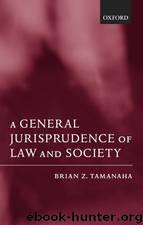2018-07-26 17:39:00.555799 by Unknown

Author:Unknown
Format: epub
Published: 2014-05-10T16:00:00+00:00
Transnational Legal Culture
One of the sources contributing to the development of the new lex merca-toria, though also an independent development in its own right, is the ongoing creation of a transnational legal culture. Legal culture is a term with many different meanings (see Nelken 1995; Friedman 1969a, 1975). Here I use it to refer to the law-related ideas, knowledge, beliefs, and attitudes of legal specialists.
There are several distinct aspects to the development of a transnational legal culture. A core component has to do with a notable growth in the number of law students, lawyers, and legal academics enhancing their background and credentials by studying at law schools abroad (see Dalyl996: 301-9). A good deal of this occurs in LLM. programmes in law schools in the United States, which attract students from around the globe (Wiegand 1991 : 230-4; Symposium 1996). ‘Graduate study in U.S. law schools is now one of the key items necessary to build a resume for a non-U.S. practitioner’ (Dezalay and Garth 1996: 313). Students also go from the United States and elsewhere to Europe, and a pan-European programme designed to help build a common culture has been instituted to allow European students to receive credit for a year of legal study in other European countries (Gessner 1994 : 136). So substantial is this phenomenon that some commentators have likened it to the dissemination of a new ius commune across Europe, one influenced by American law (Wiegand 1991 : 230-1). Another factor contributing to the formulation of a transnational legal culture is the growing academic discipline of comparative law, which has participating scholars from all over the world. Comparative law conferences, professional associations, and journals generate a worldwide community of discourse, creating a baseline of (p.128) shared knowledge and terminology. Another contributing factor is the hiring of foreign lawyers in domestic firms (see Pardieck 1996), and the growth of international law firms, with branch offices all over the world, though mostly involving US-based law firms (Taylor 1994 ; Daly 1996 : 308-13). Large US law firms, especially, owing to the clients’ economic power, have had a notable influence in shaping transnational commercial law, both in its content and its style (Dezalay and Garth 1996: 51-7; Grosheide 1994: 75). Owing to the various mentioned influences of the United States, the transnational legal culture has an ‘Americanized’ bent, with English serving as the main lingua franca.
A final factor contributing to the development of a transnational legal culture refers back to the point made by Watson, that legal professionals tend to see law as special or apart, which provides a sense of affinity with other lawyers regardless of national borders. Evidence in support of this view can be found in judging:
Judges are building a global community of law. They share values and interests based upon their belief in law as distinct but not divorced from politics and their view of themselves as professionals who must be insulated from direct political influence…. National and international judges are networking, becoming increasingly aware of one another and of their stake in a common enterprise.
Download
This site does not store any files on its server. We only index and link to content provided by other sites. Please contact the content providers to delete copyright contents if any and email us, we'll remove relevant links or contents immediately.
Becoming Supernatural by Dr. Joe Dispenza(8186)
Crystal Healing for Women by Mariah K. Lyons(7912)
The Witchcraft of Salem Village by Shirley Jackson(7243)
Inner Engineering: A Yogi's Guide to Joy by Sadhguru(6776)
The Four Agreements by Don Miguel Ruiz(6729)
The Power of Now: A Guide to Spiritual Enlightenment by Eckhart Tolle(5730)
Secrets of Antigravity Propulsion: Tesla, UFOs, and Classified Aerospace Technology by Ph.D. Paul A. Laviolette(5358)
The Wisdom of Sundays by Oprah Winfrey(5135)
Room 212 by Kate Stewart(5091)
Pale Blue Dot by Carl Sagan(4984)
Fear by Osho(4722)
The David Icke Guide to the Global Conspiracy (and how to end it) by David Icke(4685)
Animal Frequency by Melissa Alvarez(4445)
Rising Strong by Brene Brown(4433)
How to Change Your Mind by Michael Pollan(4338)
Sigil Witchery by Laura Tempest Zakroff(4229)
Man and His Symbols by Carl Gustav Jung(4116)
The Art of Happiness by The Dalai Lama(4116)
Real Magic by Dean Radin PhD(4114)
